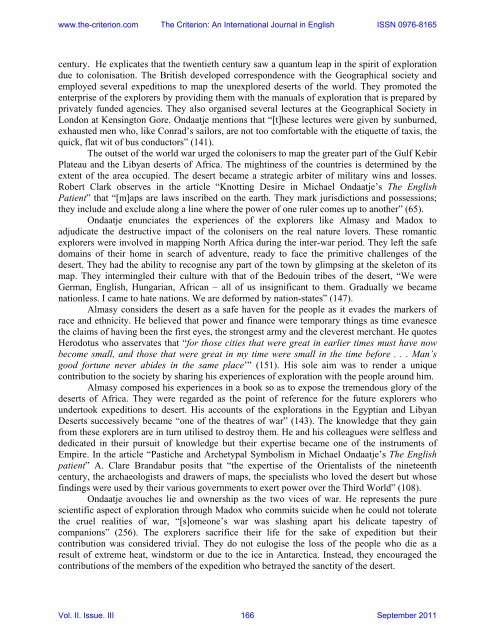Vol. II. Issue. III September 2011 - The Criterion: An International ...
Vol. II. Issue. III September 2011 - The Criterion: An International ...
Vol. II. Issue. III September 2011 - The Criterion: An International ...
You also want an ePaper? Increase the reach of your titles
YUMPU automatically turns print PDFs into web optimized ePapers that Google loves.
www.the-criterion.com <strong>The</strong> <strong>Criterion</strong>: <strong>An</strong> <strong>International</strong> Journal in English ISSN 0976-8165<br />
century. He explicates that the twentieth century saw a quantum leap in the spirit of exploration<br />
due to colonisation. <strong>The</strong> British developed correspondence with the Geographical society and<br />
employed several expeditions to map the unexplored deserts of the world. <strong>The</strong>y promoted the<br />
enterprise of the explorers by providing them with the manuals of exploration that is prepared by<br />
privately funded agencies. <strong>The</strong>y also organised several lectures at the Geographical Society in<br />
London at Kensington Gore. Ondaatje mentions that “[t]hese lectures were given by sunburned,<br />
exhausted men who, like Conrad’s sailors, are not too comfortable with the etiquette of taxis, the<br />
quick, flat wit of bus conductors” (141).<br />
<strong>The</strong> outset of the world war urged the colonisers to map the greater part of the Gulf Kebir<br />
Plateau and the Libyan deserts of Africa. <strong>The</strong> mightiness of the countries is determined by the<br />
extent of the area occupied. <strong>The</strong> desert became a strategic arbiter of military wins and losses.<br />
Robert Clark observes in the article “Knotting Desire in Michael Ondaatje’s <strong>The</strong> English<br />
Patient” that “[m]aps are laws inscribed on the earth. <strong>The</strong>y mark jurisdictions and possessions;<br />
they include and exclude along a line where the power of one ruler comes up to another” (65).<br />
Ondaatje enunciates the experiences of the explorers like Almasy and Madox to<br />
adjudicate the destructive impact of the colonisers on the real nature lovers. <strong>The</strong>se romantic<br />
explorers were involved in mapping North Africa during the inter-war period. <strong>The</strong>y left the safe<br />
domains of their home in search of adventure, ready to face the primitive challenges of the<br />
desert. <strong>The</strong>y had the ability to recognise any part of the town by glimpsing at the skeleton of its<br />
map. <strong>The</strong>y intermingled their culture with that of the Bedouin tribes of the desert, “We were<br />
German, English, Hungarian, African – all of us insignificant to them. Gradually we became<br />
nationless. I came to hate nations. We are deformed by nation-states” (147).<br />
Almasy considers the desert as a safe haven for the people as it evades the markers of<br />
race and ethnicity. He believed that power and finance were temporary things as time evanesce<br />
the claims of having been the first eyes, the strongest army and the cleverest merchant. He quotes<br />
Herodotus who asservates that “for those cities that were great in earlier times must have now<br />
become small, and those that were great in my time were small in the time before . . . Man’s<br />
good fortune never abides in the same place’” (151). His sole aim was to render a unique<br />
contribution to the society by sharing his experiences of exploration with the people around him.<br />
Almasy composed his experiences in a book so as to expose the tremendous glory of the<br />
deserts of Africa. <strong>The</strong>y were regarded as the point of reference for the future explorers who<br />
undertook expeditions to desert. His accounts of the explorations in the Egyptian and Libyan<br />
Deserts successively became “one of the theatres of war” (143). <strong>The</strong> knowledge that they gain<br />
from these explorers are in turn utilised to destroy them. He and his colleagues were selfless and<br />
dedicated in their pursuit of knowledge but their expertise became one of the instruments of<br />
Empire. In the article “Pastiche and Archetypal Symbolism in Michael Ondaatje’s <strong>The</strong> English<br />
patient” A. Clare Brandabur posits that “the expertise of the Orientalists of the nineteenth<br />
century, the archaeologists and drawers of maps, the specialists who loved the desert but whose<br />
findings were used by their various governments to exert power over the Third World” (108).<br />
Ondaatje avouches lie and ownership as the two vices of war. He represents the pure<br />
scientific aspect of exploration through Madox who commits suicide when he could not tolerate<br />
the cruel realities of war, “[s]omeone’s war was slashing apart his delicate tapestry of<br />
companions” (256). <strong>The</strong> explorers sacrifice their life for the sake of expedition but their<br />
contribution was considered trivial. <strong>The</strong>y do not eulogise the loss of the people who die as a<br />
result of extreme heat, windstorm or due to the ice in <strong>An</strong>tarctica. Instead, they encouraged the<br />
contributions of the members of the expedition who betrayed the sanctity of the desert.<br />
<strong>Vol</strong>. <strong>II</strong>. <strong>Issue</strong>. <strong>II</strong>I 166 <strong>September</strong> <strong>2011</strong>
















